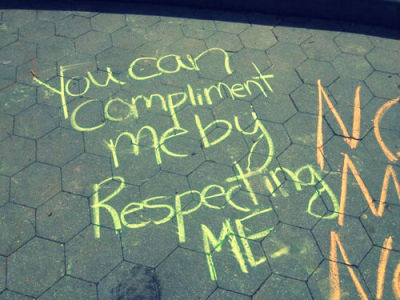By Sara Schwartzkopf, Colorado, USA, SSH Correspondent

Like most women my age, I’ve experienced my fair share of street harassment. I remember the first time being when I was 14, as I was walking back to my school after lunch break. While I was waiting to cross the street, a man pulled up in a truck, rolled down the window and proceeded to make it perfectly clear that he was leering at my chest. He didn’t say a word, just gave me a suggestive eyebrow raise and a creepy smile before driving off. I remember shuddering, walking back into school and mentioning it to friends who seemed to think it a positive that an older man had “complimented” me.
I remember that instance, not so much because it was extraordinary, but because it was the first time I had a perfect stranger make clear to me that he felt entitled to make his opinion about my body known. It was also the first time that I wondered if this really was a compliment, or if my initial reaction was right that there was something deeply wrong about that encounter.
Since then I’ve had plenty of different interactions with strangers in public places. I’ve heard and witnessed people’s unsolicited opinions on my body when I was overweight, when I was a teenager, when I was out running, when I was with my mother, traveling, hiking, kayaking, walking, shopping, riding public transit, driving in my car, or simply out with friends in public. It’s a very rare occasion indeed when I count these interactions as a positive. It’s also very rare that these comments happen when I’m with a man, and I’ve noticed many of the men in my life are unfamiliar with what street harassment is.
Now both of those things are worth unpacking. As women, we’re frequently told that we are our bodies. Our self-worth becomes inherently tied to how attractive our bodies are. So when a stranger voices their opinion on our looks, it’s implied that we should take that as a compliment (or in some cases as valid criticism). The thing is we are a lot more than our bodies. We don’t need, or particularly want, random people’s opinions on how we look when we’re trying to get any myriad of things done.
The other part of not finding these interactions to be positive is that they frequently don’t come across as compliments so much as demands for attention. Ignoring a harasser on the street at night is often followed by the fear and sometimes reality of being followed. Telling someone to leave you alone sometimes escalates to insults and outright threats. I’ve heard thoughts that men who harass are just at a loss of how else to approach without getting rejected. I don’t think I buy this. I can’t believe how inept a man would have to be to think that yelling, “Nice ass!” at a passerby would net him a better response than, well, almost anything else.
The other thing is why I don’t get harassed if I’m around a man. I can only guess this: men don’t fear what I will do when they shout things at me in public. I am a woman, which means ideally I will smile when they tell me to and say thank you when a comment is offered. Regardless of whether I need or want this validation, I’m expected to take it and move on. Yet if I’m with a man it’s considered disrespectful to him, to address me. There’s a fear and a boundary line there that other men don’t cross. I think this goes a long way to explaining why most of the men I know say they’ve never seen street harassment, or even understand what it is. To them it’s an invisible problem.
Sara is a recent graduate of the University of Denver where she majored in Sociology, International Studies, and minored in Japanese. She has previously written on issues relevant to the Native American community at Le Prestige Du Monde, pulling heavily on her experiences as a mixed-race Kiowa and Chickasaw.
